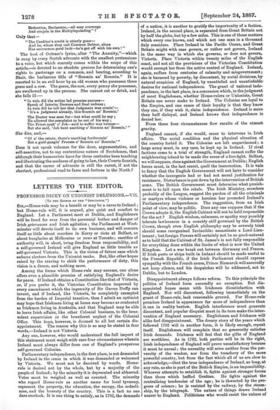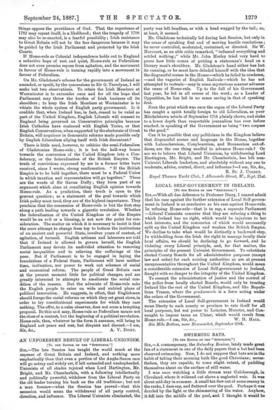LETTERS TO THE EDITOR.
PROFESSOR DICEY ON UNIONIST DELUSIONS.—VII. pro MB EDITOR OP Tun SPE0TAT0R:] Sin,—Home.rule may be a benefit or may be a curse to Ireland ; but Home-rule will, it is argued, give quiet and comfort to England. Let a Parliament meet at Dublin, and Englishmen will be freed for ever from the perennial bother and danger of Irish grievances and Irish agitation ; the Parliament at West- minster will devote itself to its own business, and will concern itself as little about murders in Kerry or riots at Belfast, as about burglaries at Melbourne or rows at Toronto ; sacrifice of authority will, in short, bring freedom from responsibility, and a self-governed Ireland will give England as little trouble as self-governed Victoria. This is the vision of future ease which seduces electors from the Unionist ranks. But, like other hopes raised by the craving to shirk the performance of duty, this vision is a dream, and nothing more.
Among the forms which Home-rule may assume, one alone offers even a plausible promise of satisfying England's desire for peace. If Ireland obtains a Constitution like that of Victoria, or, if you prefer it, the Victorian Constitution improved by every amendment which the ingenuity of Sir Cavan Duffy can invent, and if Ireland, like Victoria, be completely exempted from the burden of Imperial taxation, then I admit an optimist may hope that Irishmen living at home may become as contented as Irishmen living in Australia, and that England may be able to leave Irish affairs, like other Colonial business, to the bene- volent supervision or the beneficent neglect of the Colonial Office. This hope, however, is doomed to all but certain dis- appointment. The reason why this is so may be stated in four words,—Ireland is not Victoria.
Any one, however, who would understand the full import of this statement must weigh with care four circumstances wherein Ireland must always differ from one of England's prosperous self-governed Colonies.
Parliamentary independence, in the first place, is not demanded by Ireland in the sense in which it was demanded or welcomed by Victoria. We must not be deceived by words. Home- rule is desired not by the whole, but by a majority of the people of Ireland ; by the minority it is deprecated and abhorred. Votes must be weighed as well as counted. The minority who regard Home-rule as another name for local tyranny, represent the property, the education, the energy, the orderli- ness, and the honesty of the country. This is a fact no one dare overlook. It is one thing to satisfy, as in 1782, the demands of a nation, it is another to gratify the importunity of a faction. Ireland, in the second place, is separated from Great Britain not by half the globe, but by a few miles. This is one of those matters which every one knows, and which not one man in a thousand duly considers. Place Ireland in the Pacific Ocean, and Great Britain might with ease govern, or rather not govern, Ireland in the same way in which she governs, or does not govern, Victoria. Place Victoria within twenty miles of the English coast, and not all the provisions of the Victorian Constitution would exempt her from the active control of England. Ireland, again, suffers from centuries of calamity and misgovernment ; she is harassed by poverty, by discontent, by social divisions, by natural suspicion of England, by unsatisfied and unsatisfiable desires for national independence. The grant of national inde- pendence, in the last place, is a concession which, in the judgment of most Englishmen, whether Home-rulers or Unionists, Great. Britain can never make to Ireland. The Colonies are loyal to the Empire, and one cause of their loyalty is that they know they can, if they wish it, claim independence. Ireland is more than half disloyal, and Ireland knows that independence is denied her.
From these four circumstances flow results of the utmost gravity.
England cannot, if she would, cease to intervene in Irish affairs. The social condition and the physical situation of the country forbid it. The Colonies are left ungarrisoned ; a. large army must, in any case, be kept up in Ireland. If rival factions come to a trial of strength, England cannot suffer the neighbouring island to be made the scene of a free fight. Belfast, we will suppose, rises against the Government at Dublin; English forces must, in the last resort, quell the insurrection. It is vain to fancy that the English Government will not have to consider whether the insurgents had or had not moral justification for resistance. Disturbance is put down by the intervention of British arms. The British Government must determine what punish- ment is to fall upon the rebels. The. Irish Ministry, members probably of the League, suggest the pardon of all the criminals or martyrs whose violence or heroism has promoted Ireland's Parliamentary independence. The suggestion, from an Irish point of view, may be politic. Does any one suppose that if the Crown adopts it, the English Cabinet will not be held responsible for the act ? English wisdom, calmness, or apathy may possibly tolerate lawlessness in a country still governed by the British Crown, though even English philosophy may be severely tried• should some reorganised Invincibles assassinate a Lord-Lieu- tenant ; lint foreign Powers will certainly not be so good-natured as to hold that the Cabinet of St. James's is not fully responsible for everything done within the limits of what is now the United Kingdom. Let a war break out between Germany and France. If Irish ports or ships built in Ireland should be made useful to the French Republic, if the Irish Parliament should express sympathy with the French cause, Prince Bismarck will assuredly not keep silence, and his despatches will be addressed, not to Dublin, but to London.
Disappointment always follows reform. To this principle the of Ireland form assuredly no exception. But dis- appointed hopes mean with Irishmen dissatisfaction with England. Nor will discontent, following immediately on the grant of Home-rule, lack reasonable ground. For Home-role promises Ireland in appearance far more of independence than it can in reality bestow. English interference must generate discontent, and popular disquiet must in its turn make the inter- vention of England necessary. Englishmen and Irishmen will alike feel disappointment. The dreary story of the years which followed 1782 will in another form, it is likely enough, repeat itself. Englishmen will complain that no generosity satisfies Irish demands. Irishmen will feel that the gifts of England are worthless. As in 1782, both parties will be in the right, Irish independence of England will prove unsatisfactory because it must be unreal ; the unreality will arise neither from the per- versity of the weaker, nor from the treachery of the more powerful country, but from the fact which all of us are slow to acknowledge,—that the true independence of Ireland, as long, at any rate, as she is part of the British Empire, is an impossibility. Whoever attempts to establish it, fights against stronger forces than those which baffled Grattan. He fights against the centralising tendencies of the age ; he is thwarted by the pro- gress of science ; be is resisted by the railway, by the steam- ship, by the telegraph. The nature of things draws Ireland nearer to England. Politicians who would resist the nature of
things oppose the providence of God. That the experience of 1782 may repeat itself, is a likelihood ; that the tragedy of 1798 may also be re-enacted, is a fearful possibility ; Irish resistance to Great Britain will not be the less dangerous because it may be guided by the Irish Parliament and protected by the Irish Courts.
If Home-rule as Colonial independence holds out to England a seductive hope of rest and quiet, Home-rule as Federalism does not even promise repose from agitation, and the movement in favour 'of Home.rule is turning rapidly into a movement in favour of Federalism.
On Mr. Gladstone's scheme for the government of Ireland as amended, or spoilt, by the concessions to Sir G. Trevelyan, I will make but two observaticis. To retain the Irish Members at Westminster is to surrender once and for all the hope that Parliament may throw the burden of Irish business off its shoulders ; to keep the Irish Members at Westminster is to vitiate the whole system of English party government. Is it erodible that, when Ireland has, in fact, ceased to be ruled as part of the United Kingdom, English Liberals will consent to England being governed on Conservative principles because Irish Catholics have coalesced with English Tories, or that English Conservatives, when supported by the electorate of Great Britain, will acquiesce in democratic reforms made possible only by English Liberalism allying itself with Irish discontent P There is little need, however, to criticise the semi-Federalism of Gladstonian Home-rule ; it is but the half-way house towards the conversion of the United Kingdom into a Con- federacy, or the federalisation of the British Empire. The truth of convictions expressed by me in a former letter have received, since I wrote, strong confirmation. " If the British Empire is to be held together, there must be a Federal Union in which taxation and representation will go together." These are the words of Sir Govan Duffy ; they form part of an argument which aims at conciliating English opinion towards Home-rule. As a prediction, their truth is open to the gravest question ; as a statement of the goal towards which Irish policy must tend, they are of the highest importance. They proclaim that the concession of Home.rule is but the first step along a path leading towards a gigantic revolution. Whether the federalisation of the United Kingdom or of the Empire would be an evil or a blessing, is not now the point for con- sideration. The matter on which it is necessary to insist is that the mere attempt to change from top to bottom the institutions of an ancient and powerful State, involves years of contest, of agitation, of turmoil. English artisans and labourers are told that if Ireland is allowed to govern herself, the English Parliament may devote its undivided attention to removing social inequalities and to relieving the sufferings of the ,poor. Bat if Parliament is to be engaged in laying the foundations of a Federal State, Parliament will have neither time, inclination, nor power to work out schemes of social and economical reform. The people of Great Britain care at the present moment little for political changes, and are greatly interested in attempts to ameliorate the social con- dition of the masses. But the advocate of Home-rule asks the English people to enter on wide and untried plans of political innovation. He suggests, in effect, that Englishmen should forego the social reforms on which they set great store, in order to try constitutional experiments for which they care nothing. The offer, to a calm observer, does not seem a tempting proposal. Be this as it may, Home-rale as Federalism means not the close of a contest, but the beginning of a political revolution. Home-rule, then, whatever be the form it assumes, will bring to England not peace and rest, but disquiet and discoid—I am,



































 Previous page
Previous page